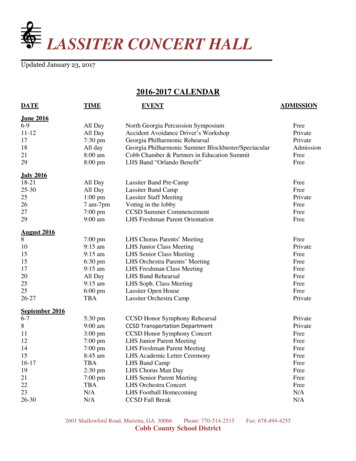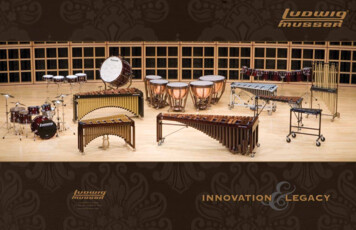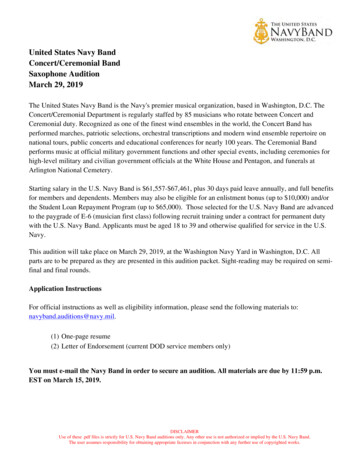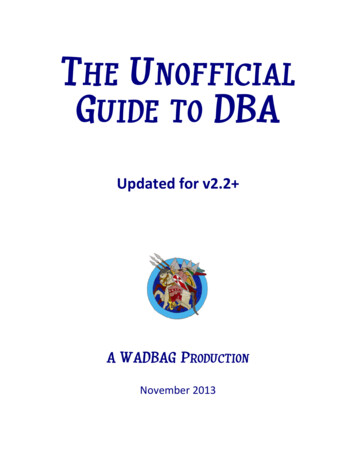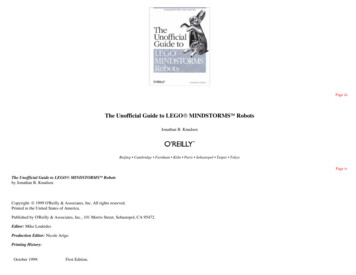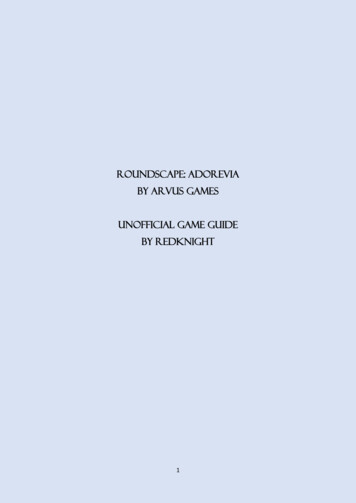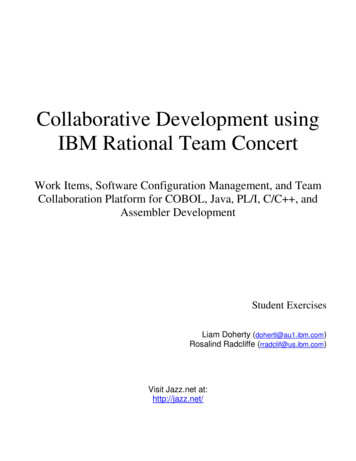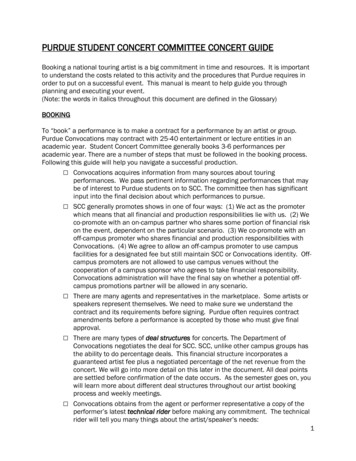
Transcription
PURDUE STUDENT CONCERT COMMITTEE CONCERT GUIDEBooking a national touring artist is a big commitment in time and resources. It is importantto understand the costs related to this activity and the procedures that Purdue requires inorder to put on a successful event. This manual is meant to help guide you throughplanning and executing your event.(Note: the words in italics throughout this document are defined in the Glossary)BOOKINGTo “book” a performance is to make a contract for a performance by an artist or group.Purdue Convocations may contract with 25-40 entertainment or lecture entities in anacademic year. Student Concert Committee generally books 3-6 performances peracademic year. There are a number of steps that must be followed in the booking process.Following this guide will help you navigate a successful production. Convocations acquires information from many sources about touringperformances. We pass pertinent information regarding performances that maybe of interest to Purdue students on to SCC. The committee then has significantinput into the final decision about which performances to pursue. SCC generally promotes shows in one of four ways: (1) We act as the promoterwhich means that all financial and production responsibilities lie with us. (2) Weco-promote with an on-campus partner who shares some portion of financial riskon the event, dependent on the particular scenario. (3) We co-promote with anoff-campus promoter who shares financial and production responsibilities withConvocations. (4) We agree to allow an off-campus promoter to use campusfacilities for a designated fee but still maintain SCC or Convocations identity. Offcampus promoters are not allowed to use campus venues without thecooperation of a campus sponsor who agrees to take financial responsibility.Convocations administration will have the final say on whether a potential offcampus promotions partner will be allowed in any scenario. There are many agents and representatives in the marketplace. Some artists orspeakers represent themselves. We need to make sure we understand thecontract and its requirements before signing. Purdue often requires contractamendments before a performance is accepted by those who must give finalapproval. There are many types of deal structures for concerts. The Department ofConvocations negotiates the deal for SCC. SCC, unlike other campus groups hasthe ability to do percentage deals. This financial structure incorporates aguaranteed artist fee plus a negotiated percentage of the net revenue from theconcert. We will go into more detail on this later in the document. All deal pointsare settled before confirmation of the date occurs. As the semester goes on, youwill learn more about different deal structures throughout our artist bookingprocess and weekly meetings. Convocations obtains from the agent or performer representative a copy of theperformer’s latest technical rider before making any commitment. The technicalrider will tell you many things about the artist/speaker’s needs:1
Sound and lighting requirementsStage requirements and stage plotDressing room requirementsBackline band gear requirementsAdvertising/marketing requirementsTransportation/ground transportation/runner requirementsHospitality/catering needsHotel accommodationsNames of contact people for the artist/speaker’s management andproduction Additional contract terms, including tax issues Complimentary tickets required and paid ticket holds Insurance requirementsThe booking agency quotes a guaranteed fee or ideal deal structure for the show,indicates who will be included in the performance and what other majorproduction expenses are expected from the buyer. We sometimes, for anadditional expense, work with what’s termed a middle agent, an agent who is asecondary buyer that may buy a group of shows for their clients.After obtaining quotes for technical services such as sound & light production,equipment rental, stage hands, front of house and ticketing services,Convocations develops a budget for the bid. All expenses anticipated for theperformance should be included in the budget. From the budget we can thendetermine what the ticket price must be in order to cover expenses and ideallymake at least a small profit.It’s not enough to rely on word-of-mouth advertising to sell a show. A morecomprehensive plan to reach your fellow students and the public is needed. Amarketing plan should be developed for each show, and goes into action as soonas we receive university approval to do the show and artist’s confirmation. Majortouring performances like SCC brings generally require traditional means ofadvertising (print, radio and Television) as well as social media, grassrootsflyering promotion and campus engagement. See the section on marketing formore complete information.A timeline should be developed for planning the event, creating a budget, getting costestimates, contacting agents, creating a checklist, marketing, catering, planning day-of-showneeds, and working the final event. The process of putting an offer together can beshortened in a lot of instances by using past show expenses as estimates for shows withsimilar amounts of trucks and production needs.2
TIMELINE(a sample timeline/template is included in this packet)It is best to give yourself ample time to plan your event. Four months is ideal – but mosttimes is not realistic. Most artists on organized tours only commit to dates around 3-4months in advance at best. They usually set aside a time period for touring and any offersthey seriously consider need to fall within that time frame. However, it does happen regularlythat artist’s will receive mutually-agreeable offers which can be used to fill in gaps on tourdates or on off times. The artist’s manager is going to look at your offer, along with all otheroffers they receive, and decide whether or not your date and location can be managed intheir travel plans. In addition, they will compare your offer with other offers to determinewhere they will make the most money and/or reach the best target audience for theirperformance.Planning a timeline is an important element of your overall event coordination. The timelinelists the deadlines for each event need and who is expected to accomplish it. Your wholeteam can use this to keep progress moving steadily forward. Some elements have to beaccomplished before others can begin. Planning and procedures will run smoother and bemore enjoyable, if everyone works together through a timeline.There are several large planning elements that will need greater detail within your overallschedule: (1) booking and contract negotiation, (2) marketing, (3) day of showschedule/show sheet, and (4) catering. All these areas have many steps and requiresomeone at the helm who can get the job done. Conquer these and you will be threequarters of the way to your goal of putting on a great event.Once your timeline is in place, be responsible for making it work by keeping on top of theduties you have been assigned. The timeline will help your organization know where you arein the planning process.3
COMPLETING THE EVENT PLANNING FORM AND PRELIMINARY BUDGET.These steps are done in cooperation with the Convocations Director of Artist Relations &Operations and the SCC Advisor. If you are using a major campus facility you need to get a technical quote on thecost of presenting the show. Convocations sends the technical rider to ElliottHall of Music for assistance in getting a quote for the use of the followingcampus venues/facilities: Elliott Hall of Music (6,005 seats) Loeb Playhouse (1000 seats) Fowler Hall (396 seats) Slayter Hill (outdoor facility)If we are not using one of these four facilities on campus then reservations foranother campus facility needs to be made with the appropriate university office,such as Space Management, Union Scheduling, University Residences,Recreational Sports, or Athletics. Off-campus facilities such as the Lafayette Theater or Carnahan Hall (both inLafayette) are also venue options that should be considered for events as well.The right venue can make all the difference in whether an event can besuccessful with the right audience. The only thing to note about most offcampus venues is that SCC would not be able to utilize SFAB subsidizedactivities dollars from the university to help off-set the event costs, as most ofthe off-campus venues would be serving alcohol. Elliott Hall of Music can provide technical support (sound, lights, staging) for anycampus venue or off-campus site. Your quote from the Hall of Music will containthe cost for facility use (if you are using one of the four major venues oncampus), sound and lights, staging, stage labor, Front of House costs (ushers,house personnel), box office charges, police and fire expense, grounds crewexpense (parking), and other equipment like ramps and barricades. If you areusing a different on-campus or off-campus site, you will need an estimate forfacility usage from the responsible organization. This information is essential tocreate the event budget. Compatibility of the technical requirements of theperformance with the proposed venue is also important. It may be too expensiveto load the show into the desired venue.Contact the Purdue Police Department to find out if they will require any specialsecurity or safety personnel for your event, and request a quote for anyadditional safety services. Check the technical rider to see if the artist requestsany T-shirt security. T-shirt security will need to be hired from an outside security 4
organization. SCC is responsible for all expenses related to the security, police,fire, and emergency medical requirements for the show.The university’s Risk Management Department will require a minimum of 1,000,000 liability insurance for your event. Large touring shows are asked toprovide 5,000,000 liability. Artists need to provide their own liability insurancethat meets the university’s minimum requirement. The cost and amount ofinsurance required may vary depending upon the type of show you present;however, the university will not insure them.International artists and/or company members are subject to Internal RevenueService (IRS) Federal Withholding Taxes at the rate of 30% of gross incomeunless a Central Withholding Agreement (CWA) or other IRS approved reductionor exemption from withholding certificate (e.g., W-8BEN) has been provided toPurdue University not less than 30 days prior to the performance date. See alsowww.artistsfromabroad.org. Individuals travelling under a valid work visa mustapply for a U.S. Social Security Number (SSN). If denied, an Individual TaxIdentification Number (ITIN) for solo artists or an Employer Identification Number(EIN) for organizations must be obtained.Further information may be found at:*Tax Treaties:CWA:W-8BEN:ITIN/EIN: d ,,id 97860,00.htmlEstimate expenses such as advertising, dressing room furniture (if any), cateringneeds, insurance, hotel, ticket selling costs, advertising, house staff, security,and transportation to reveal the true picture of what your event will cost. Someof these costs may not apply or can vary significantly from show to show.Determine how many tickets will be available for sale. To calculate this number,begin with the number of seats (venue capacity) and subtract the number ofseats that are kills for technical or sightline reasons, or will be used ascomplimentary tickets for the artist or for your guests. The SCC Advisor andConvocations Director of Marketing can assist with determining the appropriatenumber of comps to hold. The remaining seats/tickets are available for sale;however, some saleable tickets may be held for purchase by groups like fanclubs, record labels, artist management, etc.Total your costs and expenses and divide that amount by the number of ticketsavailable for sale. This number represents the ticket price you must charge tobreak even. If you want to do better than just break even, you must increase theticket price. If you have support money that can lower the ticket cost, subtractthat amount from the expenses before calculating the break even amount.Selling as many tickets as needed to reach your goal can be challenging, butwith the appropriate artist & marketing research it is always possible!The Convocations business office must submit a Ticket Rate Request Form to theVice Provost for Student Life for approval of the ticket price. A ticketed eventcannot be advertised nor tickets sold prior to this approval. Purdue Convocations Business Office (Marietta Taylor)5
Phone: 765-494-0476MAKING AN OFFER You, as a student, are NOT authorized to make an offer to an artist/speaker onbehalf of the university, nor are you authorized to agree to any kind of contract,verbal or written, that binds the university, or your university organization, topayment. Your SCC advisor will submit the offer to the artist/speaker with anyavailable dates we have for the performance. Regardless of whether we haveone date or several dates in mind, SCC and it’s adviser will need to be sure wehave put a hold on the facility for each date prior to submitting the offer. Campusfacilities are used by many campus groups. To make sure the facility will beavailable for the date you choose, you will need to make a reservation. Once adate has been confirmed with the artist/speaker, please release any unusedholds on facilities.Acceptance of an offer may take some time. Once the offer has been submitted,it is considered active until it is either withdrawn by our group, accepted (orrejected) by the artist/speaker, or until its expiration date. It is perfectlyacceptable and absolutely advisable to put a limit on how long an offer willremain acti
BOOKING To “book” a performance is to make a contract for a performance by an artist or group. Purdue Convocations may contract with 25-40 entertainment or lecture entities in an academic year. Student Concert Committee generally books 3-6 performances per academic year. There are a number of steps that must be followed in the booking process.



